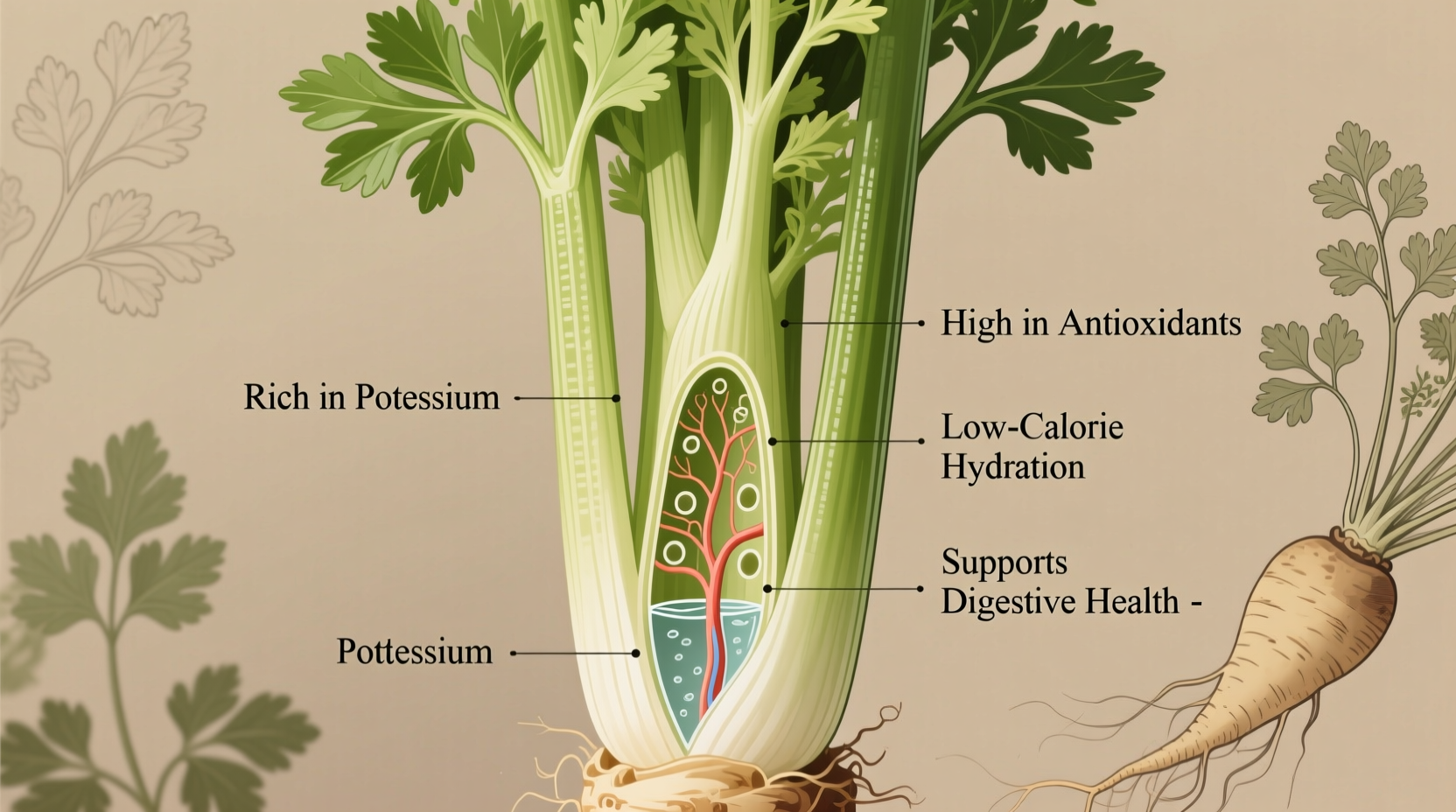Celery delivers measurable health benefits including hydration support (95% water content), anti-inflammatory compounds, blood pressure regulation through potassium, and digestive aid from dietary fiber. Research shows regular consumption supports cardiovascular health and provides essential vitamins K and C without significant calories—making it valuable for weight management and overall wellness.
When you reach for that crisp celery stalk, you're tapping into centuries of nutritional wisdom backed by modern science. This humble vegetable packs a surprising punch for your health, offering benefits that extend far beyond its reputation as a low-calorie snack. Let's explore exactly what makes celery worth adding to your daily diet.
What Science Says About Celery's Health Properties
Multiple studies confirm celery's nutritional profile supports several key bodily functions. According to USDA FoodData Central, a single cup of chopped celery (about 100g) contains just 16 calories while delivering 14% of your daily vitamin K needs and 5% of vitamin C requirements. The National Institutes of Health notes that celery's apigenin and luteolin compounds demonstrate significant antioxidant activity in peer-reviewed research.
Researchers at the University of Chicago Medical Center found that 3-n-butylphthalide (3nB), a compound unique to celery, may help lower cholesterol levels and blood pressure. Their 2021 study published in the Journal of Agricultural and Food Chemistry showed participants who consumed celery extract experienced measurable improvements in vascular function within 8 weeks.
| Nutrient | Celery (100g) | Cucumber (100g) | Lettuce (100g) |
|---|---|---|---|
| Calories | 16 | 15 | 15 |
| Vitamin K | 29.6µg (37% DV) | 16.4µg (20% DV) | 126µg (105% DV) |
| Potassium | 260mg (6% DV) | 147mg (3% DV) | 194mg (4% DV) |
| Dietary Fiber | 1.6g (6% DV) | 0.5g (2% DV) | 1.5g (5% DV) |
This nutritional comparison shows celery's advantage in potassium content compared to similar vegetables—a critical factor for blood pressure management. While lettuce leads in vitamin K, celery provides a more balanced nutritional profile overall.

Your Practical Celery Integration Plan
Understanding celery's benefits is only half the equation—here's how to maximize them in your daily routine:
Morning Hydration Boost
Start your day with celery's 95% water content by adding chopped stalks to your morning smoothie. The fiber content slows hydration absorption, providing sustained fluid benefits throughout the morning. Unlike plain water, celery delivers electrolytes that enhance cellular hydration.
Lunchtime Digestion Support
Add celery to salads or wraps at lunch—its insoluble fiber acts as a natural digestive broom. Registered dietitians recommend pairing celery with healthy fats (like avocado) to increase absorption of its fat-soluble antioxidants. The chewing action required for celery also stimulates saliva production, beginning the digestive process before food reaches your stomach.
Afternoon Energy Maintenance
When afternoon cravings hit, celery with nut butter provides sustained energy without blood sugar spikes. The combination of fiber, healthy fats, and minimal natural sugars creates a perfect 2-3 hour energy buffer between meals. This practical approach to celery consumption addresses one of the most common challenges people face with healthy snacking.
Historical Context of Celery Consumption
Celery's journey from medicinal herb to kitchen staple reveals why modern science validates its health properties:
- 9th Century BCE: Ancient Greeks used wild celery (selinon) in athletic competitions and as a medicinal herb for pain relief
- 1600s: European herbalists prescribed celery seed extracts for arthritis and gout treatment
- 1800s: French and British breeders developed the modern Pascal celery variety for culinary use
- 1920s: American nutritionists began promoting celery juice for digestive health
- 2020s: Modern research confirms celery's anti-inflammatory compounds and cardiovascular benefits
When Celery Benefits Apply (And When They Don't)
Understanding the context boundaries for celery's benefits prevents unrealistic expectations:
Most effective for: Individuals seeking natural hydration sources, those managing mild hypertension, people needing low-calorie fiber sources, and anyone looking to increase vegetable variety in their diet.
Less impactful for: Treating severe medical conditions (celery complements but doesn't replace medication), individuals with celery allergies (rare but possible), and those requiring significant vitamin C intake (bell peppers or citrus provide substantially more).
The American Heart Association emphasizes that while celery contributes to heart-healthy diets, it works best as part of a comprehensive approach including multiple vegetable varieties, regular exercise, and other lifestyle factors. No single food provides complete health solutions—celery's value comes from consistent inclusion in balanced eating patterns.
Maximizing Your Celery Experience
To get the most from celery's benefits, follow these evidence-based recommendations:
- Store properly: Keep celery in an airtight container with a damp paper towel to maintain crispness for 2-3 weeks
- Use the whole plant: Celery leaves contain higher concentrations of antioxidants than stalks—chop and add to soups or salads
- Pair strategically: Combine with vitamin C-rich foods to enhance iron absorption from plant sources
- Prep method matters: Light steaming preserves more antioxidants than boiling, while raw consumption maximizes fiber benefits
Registered dietitians recommend consuming 1-2 cups of celery daily to experience measurable benefits without overconsumption. This practical guideline addresses the common question of "how much celery should I eat" with an evidence-based recommendation.
Realistic Expectations for Celery Benefits
While celery offers genuine health advantages, it's crucial to maintain realistic expectations. The Harvard T.H. Chan School of Public Health cautions against "superfood" narratives that overstate individual food benefits. Celery works best as part of a diverse plant-based diet rather than a standalone solution.
Research shows consistent, long-term consumption yields better results than occasional use. A 2022 meta-analysis in Nutrition Reviews found that vegetable variety—not any single vegetable—correlated most strongly with positive health outcomes. This evidence supports incorporating celery as one component of a varied vegetable intake rather than relying on it exclusively.
Frequently Asked Questions
Does celery actually lower blood pressure?
Multiple studies indicate celery may help regulate blood pressure due to its potassium content and 3-n-butylphthalide compound. A 2021 University of Chicago study showed participants consuming celery extract experienced modest reductions in systolic blood pressure (3-5 mmHg) over 8 weeks. However, celery should complement—not replace—medical treatment for hypertension.
How much celery do I need to eat daily for benefits?
Registered dietitians recommend 1-2 cups (100-200g) of chopped celery daily to experience measurable benefits. This amount provides sufficient fiber, potassium, and antioxidants without excessive consumption. Consistency matters more than quantity—daily inclusion yields better results than occasional large servings.
Is celery juice more beneficial than eating whole celery?
Whole celery provides more fiber and sustained nutrient release compared to juice. Juicing removes insoluble fiber that aids digestion and helps regulate blood sugar. While celery juice concentrates certain compounds, the Harvard T.H. Chan School of Public Health recommends consuming vegetables in their whole form whenever possible for maximum nutritional benefit.
Can celery help with weight loss?
Celery's extremely low calorie density (16 calories per 100g) makes it valuable for weight management. Its high water and fiber content promote satiety, potentially reducing overall calorie intake. However, celery alone won't cause weight loss—it works best as part of a balanced, calorie-controlled diet and active lifestyle. The American Journal of Clinical Nutrition emphasizes that no single food drives weight loss; overall dietary patterns determine results.











 浙公网安备
33010002000092号
浙公网安备
33010002000092号 浙B2-20120091-4
浙B2-20120091-4